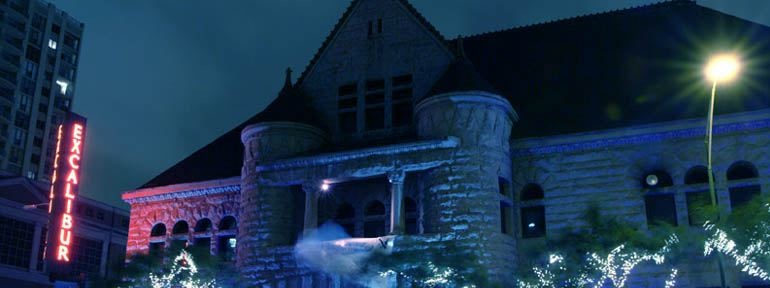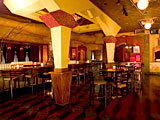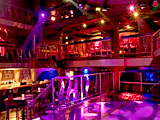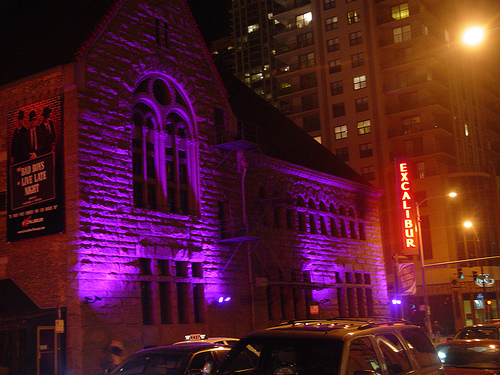 Just the words “Excalibur Nightclub” send shivers up and down the spine of many who know it… and it’s haunted. The building housing the nightclub dates back to the late 1800s and was the original location of the Chicago History Museum. With its three levels and 60,000 square feet of adult entertainment, its late-night license and its intriguing history, Excalibur Nightclub is one of the largest nightclubs in the city and is going as strong now as it did when it opened in 1989. Not bad for an establishment that many decry as a cheesy club version of Medieval Times.
Just the words “Excalibur Nightclub” send shivers up and down the spine of many who know it… and it’s haunted. The building housing the nightclub dates back to the late 1800s and was the original location of the Chicago History Museum. With its three levels and 60,000 square feet of adult entertainment, its late-night license and its intriguing history, Excalibur Nightclub is one of the largest nightclubs in the city and is going as strong now as it did when it opened in 1989. Not bad for an establishment that many decry as a cheesy club version of Medieval Times.
Excalibur is hard to miss: it’s the enormous, Gothic graystone located at the northwest corner of Dearborn & Ontario, adjacent to Vision Nightclub (once Aura and The Dome Room, where yours truly used to get in underage with a fake ID), and just steps from one of our favorites, the Redhead Piano Bar. The entrance to Excalibur is along Dearborn and, if you get there before 11:00pm (ish) you’ll avoid the inevitable queue that stretches down the block later as the night wears on. Dress code alert: even if you’ve heard Excalibur is cheesy, they still adhere to a “no tennis shoes, no jerseys, and no baseball hats” policy and, if your shirt doesn’t have a collar or you’re wearing baggy hip-hop pants, expect to receive extra scrutiny. After you make your way through the once-over/carding process and fork over your $10-20 cover charge to the doormen, look up and note the stately arched doorway, framed by winged gargoyles and with “Chicago Historical Society” chiseled into it, which was the organization’s original name prior to its re-branding into the Chicago History Museum to avoid being perceived as old and stodgy with selective membership (which happens to be the opposite of Excalibur Nightclub).
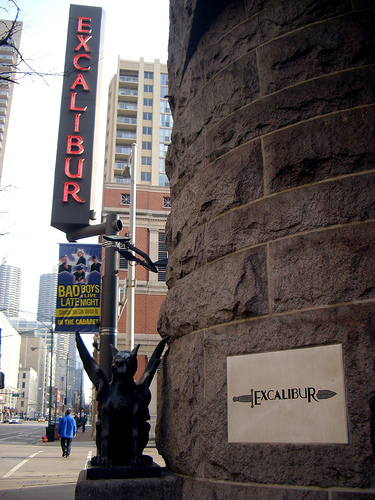

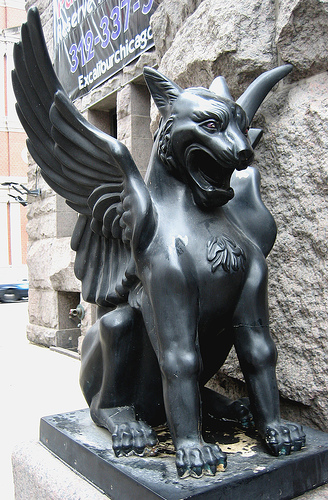
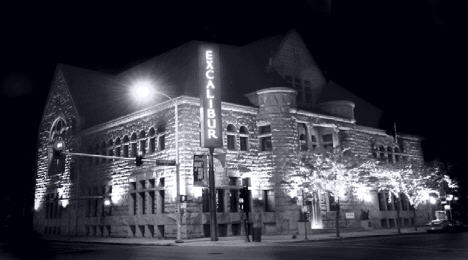 Once you’re passed through the revolving door, you’ll find a coatcheck on your right-hand a large room with a smattering of cocktail tables and a bar that runs along the south wall. From here, you have an important choice to make: where to explore? You can head up the grand staircase on your right to the techno/alternative dance floor upstairs (Latin on Thursdays) with third and fourth floor balconies, all of which is called “Club X” and will cost you an additional $5-15 cover charge. Fog Hogs and lasers are the effects of choice up here. From the main floor, you can also move straight ahead into the cheeseball retro “cabaret” on the main floor for your fix of 70s-90s music and hyperactive DJ-emcees that encourage the weak to engage in “offbeat contests.” You can chill out by heading into the plush lounge behind the first floor’s main bar. Or, you can descend downstairs where you’ll find the billiards room, air hockey gallery, photo booth, and video arcade via the staircase across from the main floor bar or via the spiral staircase in the lounge, which is cool but dangerous considering the alcohol intake of the bozo behind you. In Excalibur’s subterranean chamber, you’ll also find the room where Neil Tobin performs his Supernatural Chicago show every Friday night that is a bit freaky, a bit cheesy and definitely worth the modest price of admission. A late night menu is also served in the basement, consisting of the usual array of appetizers, wings, salads, sandwiches, burgers, and wraps.
Once you’re passed through the revolving door, you’ll find a coatcheck on your right-hand a large room with a smattering of cocktail tables and a bar that runs along the south wall. From here, you have an important choice to make: where to explore? You can head up the grand staircase on your right to the techno/alternative dance floor upstairs (Latin on Thursdays) with third and fourth floor balconies, all of which is called “Club X” and will cost you an additional $5-15 cover charge. Fog Hogs and lasers are the effects of choice up here. From the main floor, you can also move straight ahead into the cheeseball retro “cabaret” on the main floor for your fix of 70s-90s music and hyperactive DJ-emcees that encourage the weak to engage in “offbeat contests.” You can chill out by heading into the plush lounge behind the first floor’s main bar. Or, you can descend downstairs where you’ll find the billiards room, air hockey gallery, photo booth, and video arcade via the staircase across from the main floor bar or via the spiral staircase in the lounge, which is cool but dangerous considering the alcohol intake of the bozo behind you. In Excalibur’s subterranean chamber, you’ll also find the room where Neil Tobin performs his Supernatural Chicago show every Friday night that is a bit freaky, a bit cheesy and definitely worth the modest price of admission. A late night menu is also served in the basement, consisting of the usual array of appetizers, wings, salads, sandwiches, burgers, and wraps.
 The building currently housing Excalibur Nightclub is literally a Chicago landmark, designated on February 26, 1997. The architect Henry Ives Cobb designed the structure in the Romanesque Revival style and erected the roughly hewn granite building in 1892 as the second location for the Chicago Historical Society. Its look presumably inspired the medieval name, though you’ll be spared any “Knights of the Roundtable” shtick inside, of which the Excalibur in Las Vegas is painfully guilty—damn that cheap room rate! Ah, but I digress… Even today, you’ll find “Chicago Historical Society” chiseled into the stone archway over Excalibur Nightclub’s front door along with a carving of the explorers Joliet & Marquette. The Chicago Historical Society built their original building in 1865 to withstand fire in order to protect their valuable artifacts and displays. In fact, it was thought to be the only fireproof structure in the area but was instead consumed by flames during the Great Conflagration of 1871. It is said that the building manager simply paid extra money for “fireproof insurance” rather than actually taking tangible fireproofing measures… Because it was thought to be fireproof, many area residents desperately brought their valuables to the building to save them, but the blaze was too much and burned it to the ground. The caretaker barely survived by jumping out of the second story window and, before he leapt, he saw three women run inside just before the fire enveloped the building and they were never seen again. These women are now among several ghosts thought to inhabit the present-day Excalibur Nightclub.
The building currently housing Excalibur Nightclub is literally a Chicago landmark, designated on February 26, 1997. The architect Henry Ives Cobb designed the structure in the Romanesque Revival style and erected the roughly hewn granite building in 1892 as the second location for the Chicago Historical Society. Its look presumably inspired the medieval name, though you’ll be spared any “Knights of the Roundtable” shtick inside, of which the Excalibur in Las Vegas is painfully guilty—damn that cheap room rate! Ah, but I digress… Even today, you’ll find “Chicago Historical Society” chiseled into the stone archway over Excalibur Nightclub’s front door along with a carving of the explorers Joliet & Marquette. The Chicago Historical Society built their original building in 1865 to withstand fire in order to protect their valuable artifacts and displays. In fact, it was thought to be the only fireproof structure in the area but was instead consumed by flames during the Great Conflagration of 1871. It is said that the building manager simply paid extra money for “fireproof insurance” rather than actually taking tangible fireproofing measures… Because it was thought to be fireproof, many area residents desperately brought their valuables to the building to save them, but the blaze was too much and burned it to the ground. The caretaker barely survived by jumping out of the second story window and, before he leapt, he saw three women run inside just before the fire enveloped the building and they were never seen again. These women are now among several ghosts thought to inhabit the present-day Excalibur Nightclub.
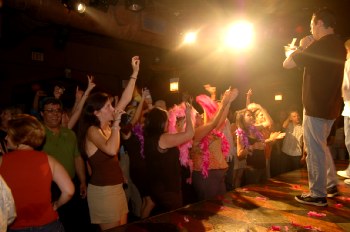
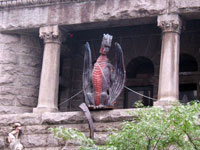
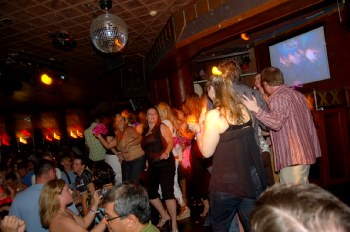
You’d better hope it doesn’t slip its chains…
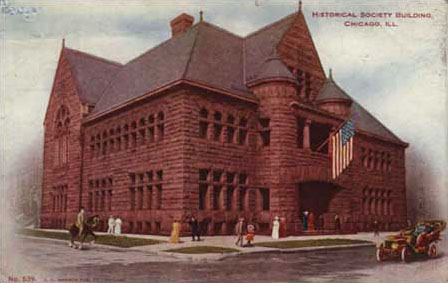 After a 40-year tenure, the Chicago Historical Society vacated the premises in 1931 when they moved into Lincoln Park, but only after creating a bit of intrigue of their own… You may have heard of Chicago’s first resident, Jean Baptiste Point du Sable, but have you ever heard the story of the second, of Jean Lalime? Lalime lived in DuSable’s old log cabin on the north bank of the Chicago River, and across from Fort Dearborn where John Kinzie killed him. Was it murder or self-defense? While reports vary, a witness account reported by Joseph Kirkland in his 1893 book, The Chicago Massacre of 1812: With Illustrations and Historical Documents described that Lalime tried to kill Kinzie over a long-standing feud that may have had something to do with Lalime’s sympathizing with the Native Americans at the time, but Lalime only succeeded in shooting Kinzie in the shoulder. During the ensuing scuffle, Kinzie apparently stabbed his attacker with Lalime’s own knife. Kinzie then moved into Lalime’s home and buried his nemesis’ body 200 yards to the west, within a white picket fence, which he tended to for many years later out of guilt. At some stage, either by Kinzie himself or that of his sons, Lalime’s body was moved onto church grounds nearby. Many years later, Lalime’s body was found by construction workers in 1891 at the corner of Illinois and Cass, and was determined to be Lalime by the local coroner after an examination and consideration of the historical accounts. Here’s the morbid part: Lalime’s skeleton was then transported to the Chicago Historical Society and kept in the new building upon its opening the following year. It is said that Jean Lalime now haunts the Excalibur Nightclub, where his body was ignominiously put on display.
After a 40-year tenure, the Chicago Historical Society vacated the premises in 1931 when they moved into Lincoln Park, but only after creating a bit of intrigue of their own… You may have heard of Chicago’s first resident, Jean Baptiste Point du Sable, but have you ever heard the story of the second, of Jean Lalime? Lalime lived in DuSable’s old log cabin on the north bank of the Chicago River, and across from Fort Dearborn where John Kinzie killed him. Was it murder or self-defense? While reports vary, a witness account reported by Joseph Kirkland in his 1893 book, The Chicago Massacre of 1812: With Illustrations and Historical Documents described that Lalime tried to kill Kinzie over a long-standing feud that may have had something to do with Lalime’s sympathizing with the Native Americans at the time, but Lalime only succeeded in shooting Kinzie in the shoulder. During the ensuing scuffle, Kinzie apparently stabbed his attacker with Lalime’s own knife. Kinzie then moved into Lalime’s home and buried his nemesis’ body 200 yards to the west, within a white picket fence, which he tended to for many years later out of guilt. At some stage, either by Kinzie himself or that of his sons, Lalime’s body was moved onto church grounds nearby. Many years later, Lalime’s body was found by construction workers in 1891 at the corner of Illinois and Cass, and was determined to be Lalime by the local coroner after an examination and consideration of the historical accounts. Here’s the morbid part: Lalime’s skeleton was then transported to the Chicago Historical Society and kept in the new building upon its opening the following year. It is said that Jean Lalime now haunts the Excalibur Nightclub, where his body was ignominiously put on display.
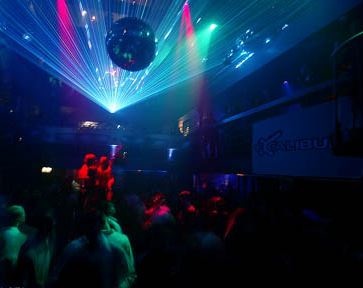 The building has had an interesting array of tenants since the Chicago Historical Society, including the Chicago office of the Works Progress Administration (WPA), Institute of Design, a rock & blues recording studio, Gallery magazine (once published by F. Lee Bailey, defender of Sam Shepherd and OJ Simpson), and a brief stint as the Factory Nightclub (1969-70). According to Dan Ibata’s article in the Chicago Tribune (January 18, 1985), “The Factory, which apparently never officially opened, was patterned after a successful Los Angeles nightclub of the same name designed by Robin Huntington. The Chicago club boasted a board of directors that included jet- set socialite Jean Pirie, entertainer Sammy Davis Jr., actors Paul Newman and the late Peter Lawford.” The building then stood vacant for over 10 years until Peter Gatien sunk $3M to renovate the space into a nightclub called Limelight, which opened in 1985 but lasted only four years. Today, Excalibur Nightclub employees claim to have seen a ghostly woman descending the stairs, glass shattering in the night at the adjacent Vision Nightclub without tripping off the motion detectors, and numerous cold spots encountered when the air conditioning or winter drafts have been ruled out. Many even refuse to go into the storage room on the upper floor without pairing up first. As a result, the Excalibur Nightclub is a favorite for every “haunted Chicago” tour, is well chronicled by Ursula Bielski in her book Chicago Haunts, and has been profiled on every ghost-hunter program such as those found on A&E and the Discovery Channel. On the other hand, it must be said that it is commonly and erroneously claimed that victims from the Eastland Disaster were brought here, when they were actually brought to the Reid Murdoch Building, the J.P. Gavin Funeral Home at 642 N. Clark (now the plush club “Manor”), and the Second Regimental Armory, which now houses Harpo Studios (I wonder if Oprah’s guests know about this?) It is also said that a lawyer that once lived in the building prior to Excalibur committed suicide on the site, but I have yet to find any confirmation of this story. I am especially suspicious of this account as the building seems to have operated only in a commercial rather than residential capacity, and this account usually appears next to those claiming bodies from the Eastland were briefly interned here.
The building has had an interesting array of tenants since the Chicago Historical Society, including the Chicago office of the Works Progress Administration (WPA), Institute of Design, a rock & blues recording studio, Gallery magazine (once published by F. Lee Bailey, defender of Sam Shepherd and OJ Simpson), and a brief stint as the Factory Nightclub (1969-70). According to Dan Ibata’s article in the Chicago Tribune (January 18, 1985), “The Factory, which apparently never officially opened, was patterned after a successful Los Angeles nightclub of the same name designed by Robin Huntington. The Chicago club boasted a board of directors that included jet- set socialite Jean Pirie, entertainer Sammy Davis Jr., actors Paul Newman and the late Peter Lawford.” The building then stood vacant for over 10 years until Peter Gatien sunk $3M to renovate the space into a nightclub called Limelight, which opened in 1985 but lasted only four years. Today, Excalibur Nightclub employees claim to have seen a ghostly woman descending the stairs, glass shattering in the night at the adjacent Vision Nightclub without tripping off the motion detectors, and numerous cold spots encountered when the air conditioning or winter drafts have been ruled out. Many even refuse to go into the storage room on the upper floor without pairing up first. As a result, the Excalibur Nightclub is a favorite for every “haunted Chicago” tour, is well chronicled by Ursula Bielski in her book Chicago Haunts, and has been profiled on every ghost-hunter program such as those found on A&E and the Discovery Channel. On the other hand, it must be said that it is commonly and erroneously claimed that victims from the Eastland Disaster were brought here, when they were actually brought to the Reid Murdoch Building, the J.P. Gavin Funeral Home at 642 N. Clark (now the plush club “Manor”), and the Second Regimental Armory, which now houses Harpo Studios (I wonder if Oprah’s guests know about this?) It is also said that a lawyer that once lived in the building prior to Excalibur committed suicide on the site, but I have yet to find any confirmation of this story. I am especially suspicious of this account as the building seems to have operated only in a commercial rather than residential capacity, and this account usually appears next to those claiming bodies from the Eastland were briefly interned here.
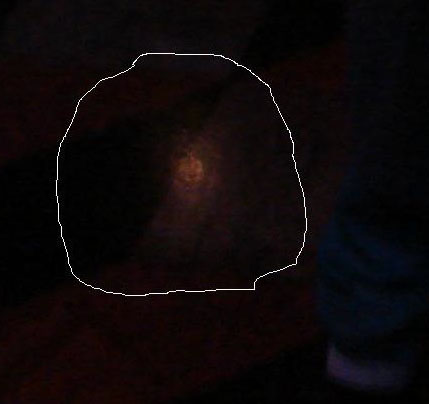 My brother took this image in the floor of Excalibur’s “Cabaret” (within the annotated white ring). What do you see?
My brother took this image in the floor of Excalibur’s “Cabaret” (within the annotated white ring). What do you see?
Reproduction of this image prohibited without express written permission from The Chicago Bar Project.
Other hauntings at Excalibur include the legion of bachelor and bachelorette parties that descend here and inevitably infest the dance floor in the “Cabaret.” You’ll also get that Poltergeist “They’re heee-re…” feeling as you observed the commingled horde of young suburbanites, 40-year-old divorcees, tourists, and conventioneers, the latter of which is thanks to the concierge kick-backs… One Yelper may have put it best: “Excalibur is where the people in town, to be on the Jerry Springer show, end up.” You’ll be hard-pressed to find many urban dwellers here as they gravitate further north and west. I used to frequent Excalibur while in college back when I had no idea of where else to go, but it served my purposes well, including my own personal victory at the time: luring no less than seven French and one Swedish au pairs there, whom I had met at Dirty Nellie’s in Palatine on a previous night. Sadly, neither my friend nor I closed any deals that night…
Despite the complaints of cheesiness, irritation at the doormen and obnoxious patrons, the Excalibur Nightclub is a Chicago classic. The building is magnificent, its history and hauntings most intriguing, and how many clubs do you know have been around for 20 years? Plus, you’ll find a most impressive Halloween display every October: a refrigerator filled with goodies Jeffrey Dahmer would be proud of, lifelike corpses and other gruesome oddities. If you like Excalibur Nightclub, you’ll probably also like the other holdings of the Ala Carte Entertainment empire: Lion Head Pub and Deja Vu in Lincoln Park, Celtic Crown in Lincoln Square, Full Shilling Public House in Wrigleyville, and Leg Room and Finn McCool’s on Division Street. You might also like other similar cheeseball palaces, include BAR Chicago, Hangge Uppe, and She-nanigan’s. For more information, check out the Excalibur website. Now, do you want to see something really scary?…
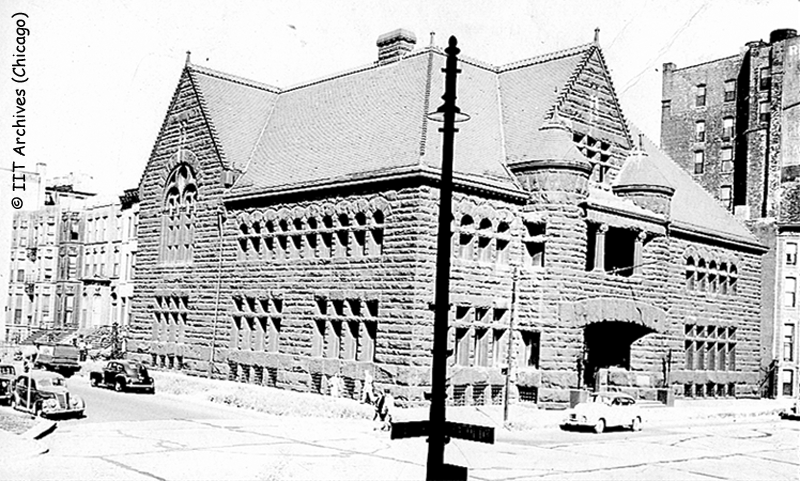
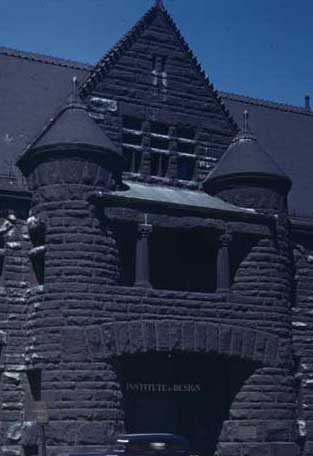
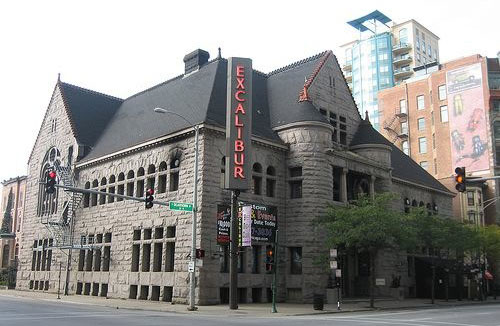
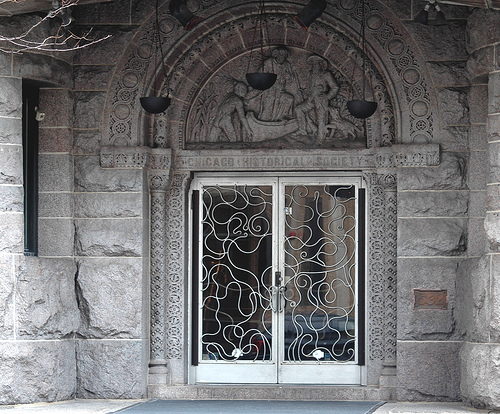
Today’s Excalibur Nightclub
